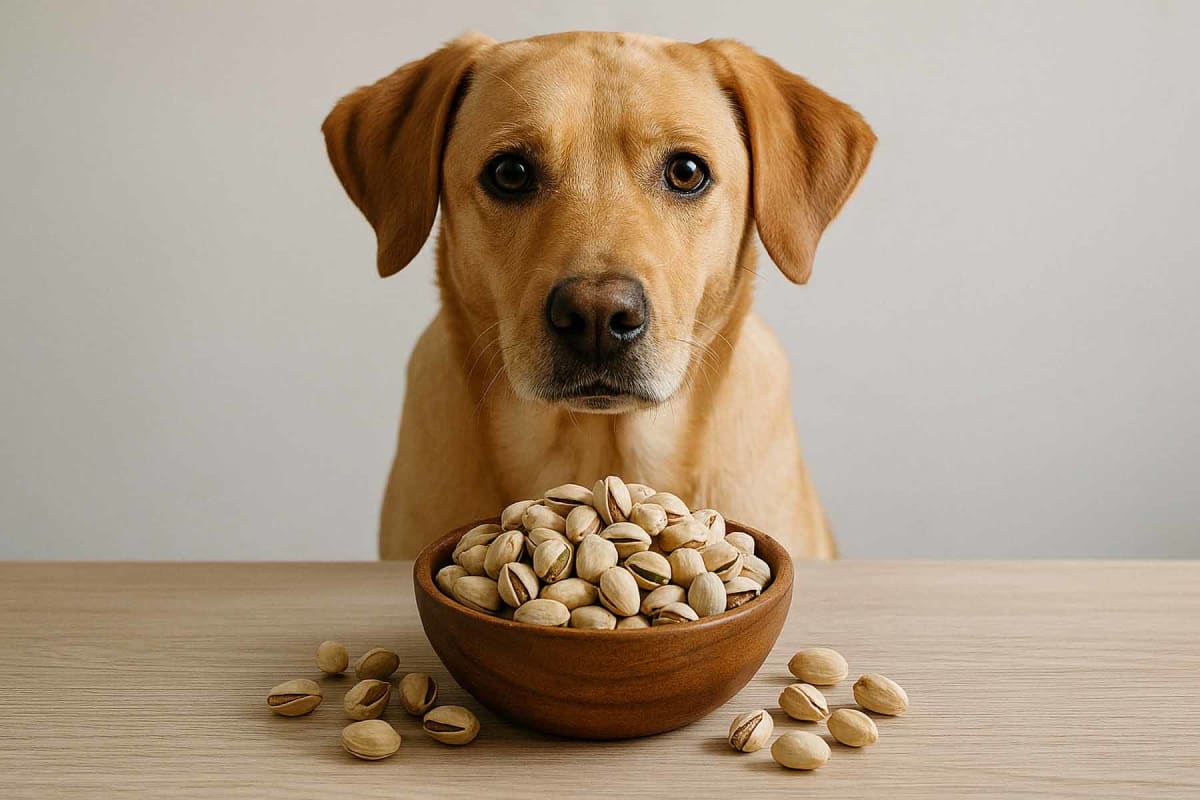
Can dogs eat pistachios?
Can dogs eat pistachios?
Can dogs have pistachios?
Pistachios are delicious, nutrient-rich nuts that many humans love, but are they safe for our canine companions? While pistachios are not toxic to dogs, they're generally not recommended as a treat for your furry friend. Although pistachios aren't inherently poisonous to dogs, the potential risks outweigh any minimal nutritional benefits they might provide.
You might find conflicting information online, with some sources suggesting pistachios are okay in very small amounts, while most veterinary experts typically recommend avoiding pistachios altogether.
Are pistachios bad for dogs?
Pistachios can be bad for dogs for several important reasons:
High fat content
Pistachios are high in fat, similar to macadamia nuts and cashews. Excessive fat in your dog's diet can lead to pancreatitis (inflammation of the pancreas), which comes with symptoms like abdominal pain, loss of appetite, upset stomach, vomiting, diarrhea, dehydration, and lethargy. Beyond acute issues, the high fat and calorie content can contribute to obesity and related health problems over time.
Salt and seasoning concerns
Most pistachios sold for human consumption contain salt or other seasonings. Too much salt can cause diarrhea, vomiting, lethargy, excessive thirst, and tremors in dogs. It can also increase fluid retention and potentially harm their kidneys, which is especially dangerous for dogs with heart conditions.
Choking and obstruction hazards
Pistachio shells pose a serious choking hazard for dogs. They can get caught in your dog's throat or become lodged in their digestive tract, potentially causing a bowel obstruction that might require emergency intervention. Even shelled pistachios can be a risk, particularly for smaller dogs who might swallow them whole.
Mold and toxin risks
Pistachios can contain aflatoxin, produced by a type of mold that commonly grows on certain foods including tree nuts. Aflatoxin poisoning can damage your dog's liver and digestive system. Additionally, pistachios contain urushiol, an oil also found in poison ivy, which can provoke allergic reactions in dogs.
Are pistachios ever good for dogs?
While pistachios contain some beneficial nutrients like Vitamin B6 (supporting nervous system and immune function), potassium (important for nerve function and muscle health), and fiber (essential for proper digestion), these benefits don't outweigh the risks.
What to do if your dog eats pistachios
If your dog has managed to sneak some pistachios:
Assess the situation: Consider important factors like: Were the nuts old? Were they already shelled? How many did your dog eat, and how big is your dog compared to the amount consumed? A small dog eating even one pistachio might be at risk for obstruction, while a larger dog consuming a few pistachios might be fine with monitoring.
Watch for symptoms: Monitor your dog closely for signs of distress, which may include:
Vomiting or diarrhea
Lethargy or weakness
Loss of appetite
Abdominal pain
Excessive thirst or urination
Difficulty breathing or swallowing
Jaundice (yellowing of eyes, gums, or skin)
Contact your veterinarian: If you suspect your dog has eaten too many pistachios and is showing concerning symptoms, contact your veterinarian immediately.
If your regular vet is not available, contact the ASPCA Animal Poison Control Center at (888) 426-4435. Quick action is essential, especially if you suspect your dog may have eaten pistachio shells or moldy nuts.
Safer alternative treats for dogs
Instead of pistachios, consider these safer and healthier treats for your four-legged friend:
Fruits: Many dogs enjoy apple slices (without seeds), blueberries, strawberries, and watermelon (without seeds). These provide vitamins and fiber without the high fat content of nuts.
Vegetables: Carrots, green beans, and cucumber slices make excellent low-calorie crunchy treats that can satisfy your dog's desire to chew.
Commercial dog treats: There are many specially formulated treats designed specifically for dogs that provide the right balance of nutrients without harmful ingredients.
Plain, cooked meat: Small pieces of boiled chicken or turkey (without bones, skin, or seasoning) can be a high-value treat for training or special occasions.
Dog-safe nut alternatives: If you're looking for something nutritious, consider small amounts of plain, unsalted peanut butter (xylitol-free) as an occasional treat.
Remember that any foods safe for dogs should be limited to no more than 10% of their daily caloric intake to maintain a balanced diet and healthy weight.